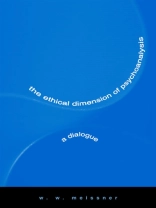Addressing the common ground between ethics and psychoanalysis, W. W. Meissner asks ‘Does psychoanalysis have anything to contribute to ethical understanding and reflection?’ and conversely, ‘Does ethics have anything to offer analytic understanding of the complexities of human behavior and decision-making?’ Both disciplines focus their interest and concern not only on the inner well-being of the individual, but also on questions of his or her adaptation to the outside world, including both intimate personal relations as well as broader societal and communal relations. This book explores and explicates areas of interaction and common interest between these two disciplines in the hope of opening the way to further exploration and dialogue in the understanding of the human phenomenon.
Table des matières
Preface
1. Freudian Ethics
2. Psychoanalysis and Ethical Systems
3. Psychic Determinism and Motivational Principles
4. Volition and Will
5. Freedom of the Will
6. Psychodynamic Hedonism and the Pleasure Principle
7. Narcissism and Egoism
8. Object Love and Altruism
9. Ethical Decision-Making and Self-Deception
10. Responsibility
11. Superego and Moral Development
12. Superego Functions and Conscience
13. Character and Virtue
14. Values
Notes
References
Index of Names
Subject Index
A propos de l’auteur
W. W. Meissner is University Professor of Psychoanalysis at Boston College and Training and Supervising Analyst Emeritus at Boston Psychoanalytic Institute. He is the author of many books, including
Freud & Psychoanalysis;
The Cultic Origins of Christianity: The Dynamics of Religious Development; and
The Therapeutic Alliance: The Vital Element of Clinical Practice.











